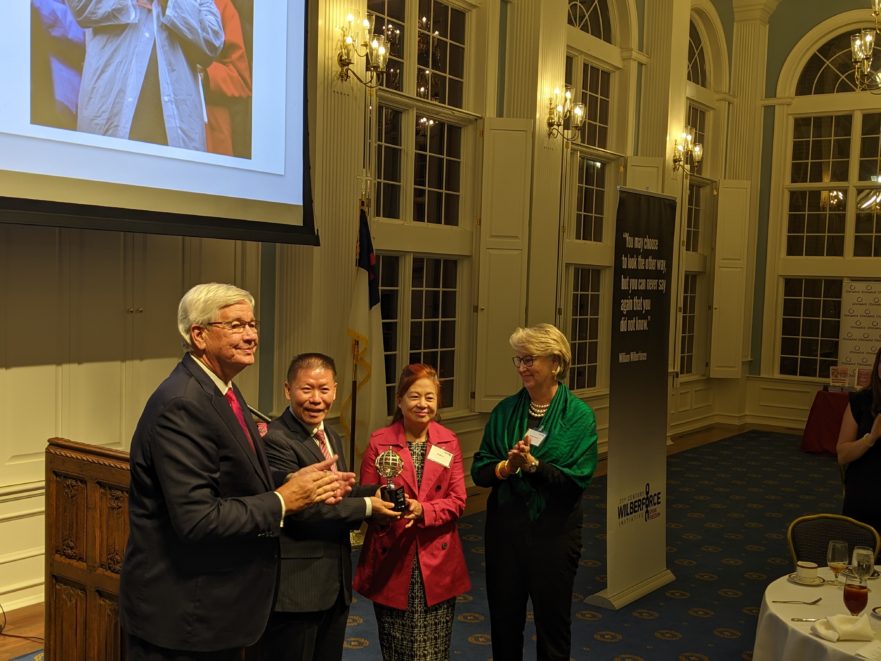October 20, 2022
By Ken Camp, Managing Editor
Religious persecution in China today is worse than it has been in decades, former Chinese dissident and longtime international human rights advocate Bob Fu told a gathering at Dallas Baptist University.
Chinese President Xi Jinping made clear in his Oct. 16 address to the National Congress of the Chinese Communist Party what his actions already had revealed—a desire for “more control” in every area, Fu told participants at a dinner sponsored by 21Wilberforce.
Fu received the Frank Wolf International Religious Freedom Award from 21Wilberforce, a Christian human rights organization focused on global freedom of religion, belief and conscience.
A one-time teacher in a communist school in China, Fu became a Christian and the pastor of a network of underground Chinese churches, which led to his arrest and imprisonment. He and his wife escaped from China and eventually settled in the United States, where he became founding president of the ChinaAid advocacy organization.
Fu said the Chinese Communist Party has “launched a war against the cross,” outlawing its public display throughout the nation. The party labeled the cross “a national security threat” and began “a cross demolition campaign,” he explained.
Some pastors who refused to remove the cross from buildings received 12- to 14-year prison sentences, Fu noted.
Meanwhile, the Chinese government has involuntarily detained more than 1 million Uyghur Muslims in “modern-day concentration camps” in recent years, he added. Both the U.S. Secretary of State and the United Nations Office of the High Commissioner for Human Rights have condemned China’s actions toward the Uyghurs as genocide and crimes against humanity.
While acknowledging he is discouraged by increased religious oppression in China, Fu noted he remains encouraged in the long term.
He recalled the religious revival that followed persecution during Mao’s Cultural Revolution, and he predicted a “much bigger revival” could result from the suffering of Chinese Christians today.
‘Creatively disruptive’ God’s people are called to “a kind of good that is never settled or tame, but creatively disruptive to systems of oppression,” Ross Chandler, pastor of First Baptist Church in Marble Falls, told participants at the DBU event. Ross Chandler, pastor of First Baptist Church in Marble Falls, describes the responsibility of Christians to be “creatively disruptive to systems of oppression.” (Photo / Ken Camp)
Ross Chandler, pastor of First Baptist Church in Marble Falls, describes the responsibility of Christians to be “creatively disruptive to systems of oppression.” (Photo / Ken Camp)
“If any one person in our world is not religiously free, none of us are religiously free,” said Chandler, who serves on the 21Wilberforce board.
God’s people are called to act as Pastor Andre Trocme and his church in Le Chambon, France, responded during World War II, he asserted. The small Protestant congregation sheltered about 4,000 Jews fleeing the Holocaust.
“Andre Trocme developed an aggressive celebration of life. And when oppression came to his door, he was ready,” Chandler said.
A few years ago, Chandler and his family visited Le Chambon and worshipped in the church where Trocme was pastor 80 years ago. Decades removed from the Nazi Occupation, Chandler initially wondered if the church remained committed to Trocme’s “aggressive celebration of life.” He was pleasantly surprised by what he witnessed.
“All over their sanctuary, they had cardboard cutouts sitting in every pew” representing refugees and persecuted people from Syria, Myanmar and Iran, Chandler said. Each Sunday, worshippers sit in pews alongside representative images of people around the world who are suffering.
“Those people in that little church in Le Chambon are my favorite church in the world. They are a megachurch in terms of their faithfulness,” he said.
Globalization enables Christians on one side of the globe to know about the suffering of faithful people on the other side of the world, Chandler said.
“Today, we can do more than we ever have before. Globalization is giving us brand new winds for religious freedom. Normal people are connecting with other normal people across the globe every day,” he said. “And when a butterfly flaps its wings on one side of the world, it is causing a hurricane on the other.”
Why defend the persecuted?
Randel Everett, founding president of 21Wilberforce and former executive director of the Baptist General Convention of Texas, suggested five reasons why Christians should defend the persecuted.
- “I want to be where Jesus is working.” In Luke 4, when Jesus began his public ministry, he made it clear he identifies with and works among those who are suffering.
- “We are commanded to do it.” The admonition in Hebrews 13:3 to “remember those who are in prison” is as much an imperative command as the Great Commission, Everett said.
- “Religious freedom is part of our missions strategy.” In Romans 10:13, the Apostle Paul states, “Everyone who calls on the name of the Lord shall be saved.” But in the verses that follow, Paul asks how anyone can believe unless they have heard and how anyone can hear unless the gospel is proclaimed freely.
- “We are to comfort those who are in prison.” Paul commended the Philippian church for the way they cared for him during his imprisonment for the gospel’s sake.
- “We can make a difference.” Through prayer, encouragement and advocacy, people of faith who are concerned about religious freedom for all are bringing about positive change, Everett asserted.
This article is reprinted from Baptiststandard.com

